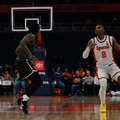Fair and balanced: Despite personal ideologies, professors strive for impartiality in the classroom
It’s no secret that most college campuses are predominantly ‘liberal’ atmospheres. Quads of universities across the nation have witnessed some of the fiercest marches, sit-ins and protests in the country’s history. Syracuse University in particular has a strong presence in such history and, especially in a blue state like New York, it’s hard to ignore the likelihood that left-leaning tendencies find their way into lecture halls on campus.
At SU, Democratic students with liberal ideals stereotypically dominate the college scene, and one would be hard-pressed to find anyone to disagree with the notion that the majority of college professors do much the same thing.
William Stinchcombe, however, a history professor in the Maxwell School of Citizenship and Public Affairs, believes the high number of left-leaning educators has less to do with politics and more to do with the profession itself.
‘Ninety percent of Army officers are Republicans. Ninety percent of college professors are Democrats,’ he said. ‘It’s a self-selecting process that can’t be avoided.’
No matter what the reason for the abundance of liberal ideals on campus, the lecture content of university professors is designed to mature student minds and broaden their knowledge, not steer them in one direction or the other, according to SU faculty members.
‘There is plenty of data that shows elite institutions tend to have professors that are more liberal in their politics, and there is no reason to believe that SU should be any different,’ said David Rubin, dean of the S.I. Newhouse School of Public Communications. ‘Does that affect what goes on in the classroom? Probably not.’
Rubin’s confidence in the impartiality of the university’s educators is rooted in nearly two decades of firsthand observation and experience.
‘I have read every course evaluation of junior faculty members for 16 years,’ Rubin said, ‘and I can’t recall any student ever complaining that he or she didn’t like their professor because of the professor’s political views in the classroom.’
That’s not to say that the presentation of ideologically sensitive material isn’t slanted from time to time.
Paul Troisi, a junior political science major, said, ‘I have had to sit through classes with professors that assigned liberal books to match their liberal agendas, but I’ve also had professors who present information in a fair, non-biased manner,’ which, he added, ‘seems to work much better among students.’
To claim that no professor at SU has ever had an imbalance of ideological material would be bordering on naivet, but administrators and faculty members from both Maxwell and Newhouse maintain unyielding confidence in the objectivity of their program’s professors.
‘Are some professors’ lectures biased? Sure, a few stand on a soapbox, but the majority take pride in their impartiality and their ability to get students to understand both sides of the issue,’ said Jeff Stonecash, chairman of the political science department in the Maxwell School.
Stonecash dismissed the idea that biased presentation of material could have serious effects on student thought.
‘Students just lose respect for and dismiss professors when they realize he or she is using the lecture as a soapbox,’ he said.
Troisi agrees that students well-versed in political matters are less likely to take lecture bias as accepted fact, but says the problem concerns the less politically savvy undergraduates.
‘For anyone who can think for themselves and analyze information independent of what professors think, (professor bias) is not a big deal,’ Troisi said. ‘But for students that only absorb small amounts of political information, the little they get will influence them greatly, which is why it is vital that professors present all sides.’
Stonecash argued that while many professors clearly communicate their liberal ideologies to classes, nearly all work hard to create an atmosphere in which students from every end of the ideological spectrum feel comfortable expressing their opinions.
‘There is a professor at this university who is Marxist, and he tells classes that up front,’ Stonecash said. ‘His goal, however, isn’t to preach his ideology, it is to teach students how to make a case and defend it, and that is something a lot of students find very helpful.’
Indeed, diversity of thought is crucial to the development of intellectual depth, and is something that SU professors, particularly those in the Maxwell School, take seriously, according to faculty and administrators like Stinchcombe and Stonecash. At least once in their college career, students will encounter a professor who doesn’t share like ideals, but Stinchcombe says this can be advantageous.
‘You just have to dismiss the bias and realize the truth: There are a lot of really bright people with mindsets different from yours, and that’s what you want. You can learn from people you don’t agree with ideologically,’ he said.
Troisi, who is also the president of the SU College Republicans, couldn’t agree more, stating, ‘I’m not paying money for someone to tell me what to think, I’m paying for them to teach me how to better think for myself.’
This kind of dexterity of mind is an educational objective that Rubin has for all the students that pass through the Newhouse School, and he emphasizes the importance of a diversity of information.
‘Our professors are not propagandizing, they’re challenging students to have opinions while keeping their minds open to information that challenges those opinions,’ he said. ‘I’m a strong believer in an open marketplace of ideas: The more information you have, the more able you’ll be to make good decisions.’
Bias or no bias, for better or for worse, Stonecash says the political science program doesn’t practice oversight of professor lectures or syllabi and that ideology is not taken into account when professors are hired to teach.
‘It’s irrelevant,’ Stonecash said. ‘What is relevant is how well they can teach, the research they’ve conducted and how well they work with the rest of the faculty. There’s no thought police.’





